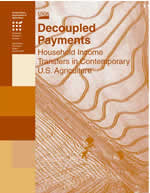Decoupled Payments: Household Income Transfers in Contemporary U.S. Agriculture
- by Mary E. Burfisher and Jeffrey W. Hopkins
- 2/1/2003
Overview
Decoupled payments are lump-sum income transfers to farm operators that do not depend on current production, factor use, or commodity prices. Such payments are not currently constrained by global trade rules, but many countries argue that they distort production and trade and that their use should be limited. This report examines the U.S. experience with decoupled payments in its Production Flexibility Contracts program under the Federal Agriculture Improvement and Reform (FAIR) Act of 1996. The payments have improved the well-being of recipient farm households, enabling them to comfortably increase spending, savings, investments, and leisure but with minimal distortion of U.S. agricultural production and trade. However, farm operators may retain as little as 40 percent of program benefits due to higher land rents. While commercial farms received the largest share of decoupled payments, they rent in over two-thirds of their program acres, which suggests that a sizable portion of their program benefits may be passed through to nonfarming landowners. (Mary E. Burfisher and Jeffrey Hopkins, editors)
Download
-
Entire report
Download PDF -
Frontmatter
Download PDF -
Introduction
Download PDF -
Decoupled Payments as Income Transfers: Conceptual Framework of the Study
Download PDF -
Implementation of the U.S. Production Flexibility Contract Program
Download PDF -
Effects of Decoupled Payments on Household Consumption, Savings, and Investment
Download PDF -
Decoupled Payments and Farm Labor
Download PDF -
Effects of Decoupled Farm Payments on Aggregate Agricultural Supply
Download PDF -
Need for Additional Research
Download PDF -
Conclusions
Download PDF -
Recommended Readings
Download PDF -
Appendix
Download PDF


